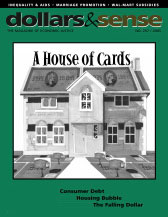Bubble Trouble
Talk about irrational exuberance. Housing is the new bull market.
This article is from the January/February 2005 issue of Dollars and Sense: The Magazine of Economic Justice available at http://www.dollarsandsense.org

This article is from the January/February 2005 issue of Dollars & Sense magazine.
Subscribe Now
at a discount.
As lukewarm as the economic recovery has been, it would have been far chillier if not for the housing market. Throughout the recession and recovery, overheated housing prices have kept the economy simmering.
Since late 1995, housing prices have risen nationwide by almost 35% after adjusting for inflation. In some regions, real home prices have risen by more than 50% (see table). Such a steep run-up is abnormal. Prior to 1995, home prices had closely tracked the inflation rate.
By borrowing against the inflated values of their homes throughout the economic slowdown, families spurred consumption growth--despite the weak job market and stagnant wages--providing much of the lift for the current recovery. Since Bush took office in 2000, the amount of outstanding mortgage debt has risen a remarkable 50.4%. As a result, the ratio of mortgage debt to home equity hit a record high in 2003.
The Run-Up in Home Prices
| Rate adjusted for inflation | |
| United States | 41.5% |
| Northeast | 70.7% |
| Mid-Atlantic | 46.2% |
| East South Central | 16.2% |
| West South Central | 17.4% |
| South Atlantic | 42.3% |
| East North Central | 46.1% |
| West North Central | 50.7% |
| Mountain States | 45.7% |
| Pacific | 78.8% |
Source: Housing Price Index, Office of Federal Housing Enterprise Oversight, 2004.
Some argue there's no need to worry; the rise in housing prices is not a bubble, but is founded on genuine factors such as scarce urban land, immigration, and income growth--but these explanations don't make sense. Vacant land in many urban areas has long been scarce, but this never before led to such a surge in prices. And most immigrants are not in the market for the half-million dollar homes that are driving the bubble in several regions. Income doesn't get us far in explaining the bubble, either; income growth during the late 1990s pales in comparison to the period between 1951 and 1973, when there was no bubble. Plus, the housing bubble has continued to grow over the past 3.5 years, when income growth was leveling off.
The housing bubble most likely has its origins in another bubble--the stock bubble of the late 1990s, when investors used their Wall Street returns to buy pricier homes. The increased demand began to drive up prices; soon, homebuyers came to expect continued price increases and based their purchase decisions on that expectation. Homebuyers who may otherwise have viewed a $200,000 home as too costly became willing to pay that much in the expectation that the home would sell for far more down the road. Expectations of ever-rising prices drive speculative bubbles.
Sound familiar? Indeed, the current housing bubble is not unlike the run-up in stock prices to which it owes its origins. If and when this bubble bursts, as the stock bubble did, the economy will likely find itself in another recession, and millions of families will see their net worth disappear as their homes, particularly those in over-inflated housing markets, plummet in value. With nearly 40% of new homebuyers choosing adjustable-rate mortgages, and interest rates on the rise, some homebuyers could face increased mortgage payments even as the values of their homes fall. Those with high debt-to-equity balances could face negative equity, or the prospect of owing more than they own.
The recent rise in mortgage rates has begun to slow the four-year refinancing frenzy, but the middle class is now so laden with mortgage debt that the damage when the bubble bursts will be widely felt.
